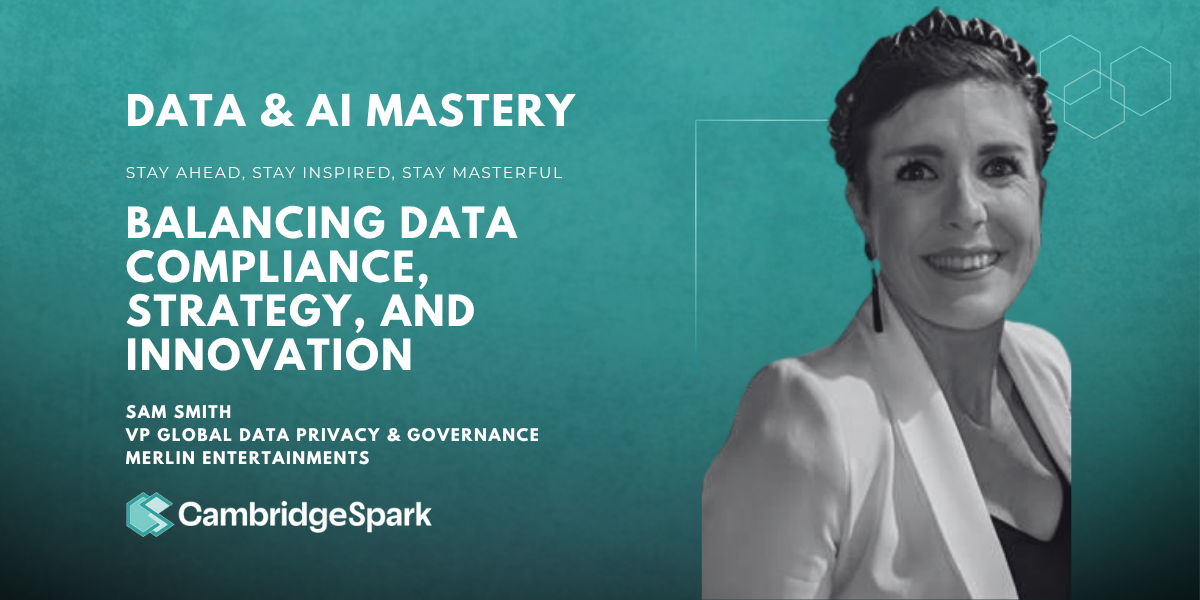In today’s data-saturated world, data governance is no longer a compliance checkbox or an IT concern. It’s a strategic necessity, and it’s essential to how modern organisations operate, innovate, and build trust.
If your organisation is collecting, storing, or using data (and let’s be honest, who isn’t?), the way you manage it matters more than ever.
In a recent conversation with Sam Smith, VP of Global Data Privacy & Governance at Merlin Entertainments, we explored the rising importance of data governance and privacy in organisations of all sizes. As Sam puts it, “Data is a company's biggest asset, probably the most valuable asset. That's why you have to be so, so careful with it.”
This is the moment to rethink your company’s relationship with data. Below, we share the key takeaways from this episode to help you move forward with confidence..png?width=1860&height=955&name=Reimagining%20Employee%20Experience%20in%20the%20Age%20of%20AI%20(1).png)
What is Data Governance?
Data governance is the foundation that ensures your organisation’s data is accurate, well-organised, secure, and used responsibly. It defines the roles, responsibilities, policies, and processes that make data work for you and not against you. But more than that, it’s a culture of stewardship. A shared commitment to handle data with care and clarity.
At its best, data governance is both a defensive shield and an offensive strategy.
It protects your organisation from risk, and it empowers your people to do their best work with insight, confidence, and accountability.
Why It Matters: The Carrot and the Stick
Strong data governance separates organisations that react to problems from those that prevent them altogether.
As Sam explains, “There is a big, scary stick that you can smack people with to say, you get this wrong, it's not going to be good. But there's also this really like beacon of hope. If you get this right, you're going to have such insight into what the business can do, what it's doing, where the room for improvement is, more importantly, where the data is.”
So is it the carrot or the stick? The answer is both.
Without governance, data gets trapped in silos, systems become fragmented, and your organisation is vulnerable to compliance failures and inefficiencies. But with it, you unlock value across every organisation.
“Without data governance, you can't benefit from data and the little silos that you might not be aware of. So it is kind of 50/50. 50% insurance, 50% innovation.”
Good governance protects your organisation from risk while unlocking the full strategic potential of your data. With it, your organisation doesn’t just comply. It competes. Smarter, faster, and more ethically.
How AI Has Changed the Game
The rise of generative AI has thrown even more complexity into the mix.
From privacy and intellectual property to brand reputation and ethical concerns, AI amplifies every concern surrounding data. It touches every function and raises new questions for every team.
As Sam shared, “There are many ways to get it wrong. Get it right, and you can make a fortune. So it is really important that all of the right people get in a room and understand what the business wants to do with it.”
That’s why data governance must evolve to include AI governance. And that starts with collaboration. Legal, marketing, HR, IT, product - everyone has a role to play. It should be a shared responsibility and a business-wide conversation. The future of responsible innovation depends on it.
Where to Start: Making it Real in Your Organisation
So, where do you begin? The key is to start small, start early, and stay close to where the action is.
“You have to have that kind of willingness to listen, the willingness to learn, and the ability to kind of put your foot in the door and get into the right conversations,” as Sam nicely puts it.
A few steps to move forward:
- Map your data: Know what you have, where it is, and who’s responsible.
- Assign clear roles: Empower data owners to guide direction and data stewards to uphold quality.
- Create transparent policies: Especially around privacy, access, retention, and AI use.
- Invest in education: Equip your workforce with the skills to work ethically and effectively with data and AI.
Final Thoughts
We’re entering an era where everyone within an organisation needs to be data literate.
To adopt AI responsibly and effectively, teams need more than just access to tools. They need the understanding to use them wisely.
That’s why investing in AI literacy is vital: it empowers your workforce to manage risk, unlock value, and lead with confidence.
At Cambridge Spark, that's what we're all about. We specialise in building that fluency. We partner with forward-thinking organisations to deliver world-class AI and data science training, from hands-on technical upskilling to executive education. Our programmes meet people where they are and help them grow into the challenges and opportunities ahead.
